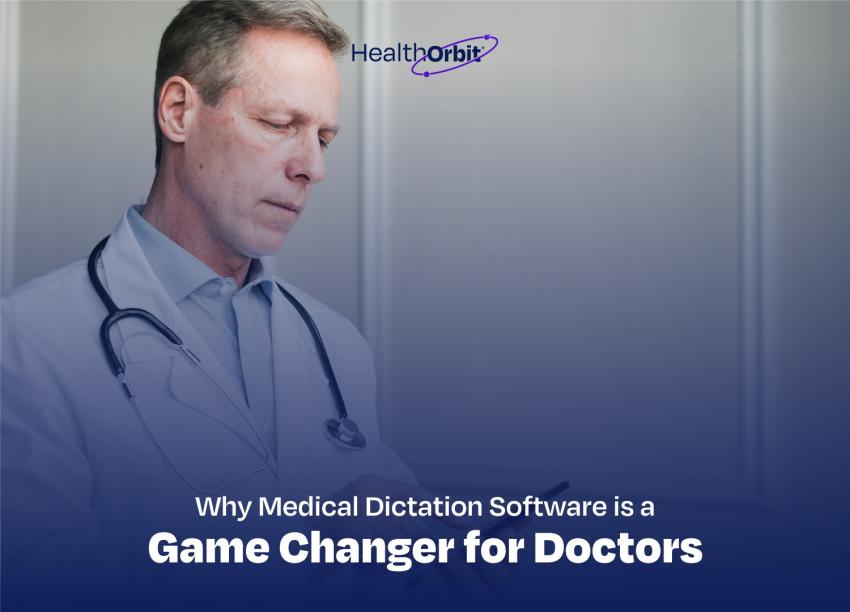
Does your daily work consist of devoting more hours to typing instead of providing care to patients? You are among many professionals who experience this situation. Medical professionals struggle with excessive documentation tasks right now. Healthcare documentation, such as progress notes alongside discharge summaries, creates substantial work, which produces job stress and forces practitioners to work longer hours while decreasing their direct patient interactions.
Fortunately, medical dictation software is sparking an evolution in these dated methods of documentation. Virtual physician documentation through AI intelligence creates on-the-spot precise documentation without needing keyboards, which gives doctors full freedom to deliver superior patient care.
Understanding the Documentation Burden in Healthcare
Modern healthcare is data-driven. Every minimal interaction must enter the system for both compliance needs and billing purposes and to support clinical continuity. The documentation systems prevalent today often fail to meet the required standards of efficiency.
According to Annals of Internal Medicine research, doctors waste half of their normal working hours completing documentation tasks for EHRs and desk work and additional documentation beyond regular hours. The combination of poor efficiency and heavy burnout levels emerges from these practices.
Common Challenges Physicians Face:
Healthcare staff currently spend numerous hours manually adding clinical notes into their electronic medical record systems.
- Lack of standardisation in documentation quality
- Errors and omissions due to fatigue or distraction
- Delayed patient care from administrative overload
What is medical dictation software?
AI medical scribe enables doctors to dictate patient encounters, assessments, and instructions directly into their devices. NLP together with machine learning helps this software convert doctors' recorded voices into structured clinical notes at high accuracy levels.
Healthcare documentation becomes faster and more consistent due to the elimination of manual typing methods that allow professionals to directly convert their verbalizations into medical records.
Real-time clinical note suggestions plus automatic ICD/CPT code insertion and EHR integration are features available through specific systems. Medical documentation gets transformed from spoken to usable medical records through dictation software that revolutionizes clinical office routines.
How AI Medical Scribes Are Shaping the Future?
An AI scribe operates as an invisible partner through patient-doctor exchanges to retrieve important medical data which it uses to write complete notes that follow medical standards. Their innovation advances surgical practice efficiency through the following features:
- Doctors maintain their workflow because they do not need to interrupt their work to type documentation. The system performs background recording of the discussion.
- Practice staff receives note transcription in real time, which becomes ready for sign-off and review.
- This medical system interprets diagnosis reports as well as medication lists and test outcomes before organizing medical documentation.
- The best dictation tools ensure medical record security by implementing protocols that match HIPAA requirements and GDPR mandates.
Features to Look for in the Best Medical Dictation Software
Picking the best medical dictation software for your clinical practice demands careful evaluation. The best platform selection must include features that guarantee accuracy as well as security and seamless system integration capabilities.
Feature Why It Matters
Voice-to-text transcription Converts speech into accurate, structured clinical notes instantly
Speciality-specific templates Speeds up documentation for various medical disciplines
Integration with EHRs Allows syncing and auto-filling of patient records
ICD-10/CPT code suggestions Supports correct billing and reduces claim rejections
Data encryption and compliance Maintains security under HIPAA/GDPR regulations
Multi-platform accessibility Dictate using mobile, desktop, or smart devices
Real-time edits and summaries Enables on-the-go adjustments and summarisation
Why Is Dictation Software for Medical Professionals Now Essential?
The healthcare system of today needs healthcare providers to deliver fast and precise documentation and work together with high levels of operational efficiency. Experts discussed how ambient listening technologies, a form of AI, could potentially save physicians 2–3 hours daily by automating note-taking and documentation. This reduction in clerical work allows for more patient interaction and enhances care quality. The need for traditional manual note-taking has become insufficient because physicians must manage multiple daily appointments.
Benefits of Using Dictation Software for Medical Professionals:
- Speed becomes five times greater when people dictate rather than type.
- The professional time devoted to diagnosis and patient interactions extends due to dictation methods.
- Reduced errors and omissions in patient records.
- Proper invoicing receives essential support because doctors include vital medical statement components at the time of billing.
- Flexible workflow: Dictate anytime, anywhere, whether in clinic or on call.
Industry Growth and Future Trends
The medical dictation software market is lined up for a massive global expansion. The medical dictation software market is estimated to cross $6.9 billion in value by 2028. As stated by Fortune Business Insights' analysis, this spike in market value is to be accompanied by an annual growth of 18.8% from 2021 to 2028.
What’s Next?
- Multilingual transcription for global practices
- Integration with virtual assistants and telehealth platforms
- The functionality of clinical decision support integrates within dictation systems.
Final Thoughts: Let Your Voice Drive Better Healthcare
Human note-writing traditions will soon disappear from practice. AI-powered medical dictation software is streamlining workflows, minimizing errors, and giving doctors the freedom to focus on patients rather than paperwork.
Practices that want increased modernization along with better documentation quality and lower administrative burdens need to implement AI dictation tools during this present moment. The healthcare industry moves forward with HealthOrbit AI, which develops medical tools that combine reliability with intelligence and security dedicated to physicians.




